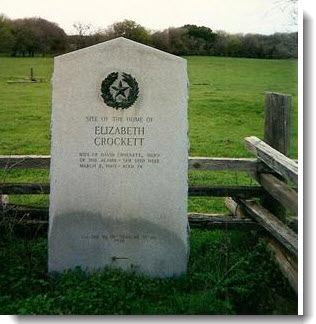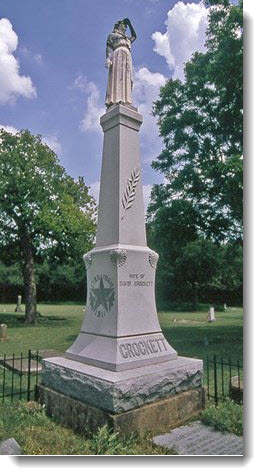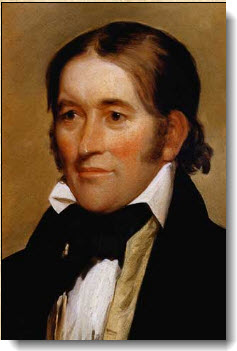ELIZABETH PATTON CROCKETT – HOOD COUNTY PIONEER
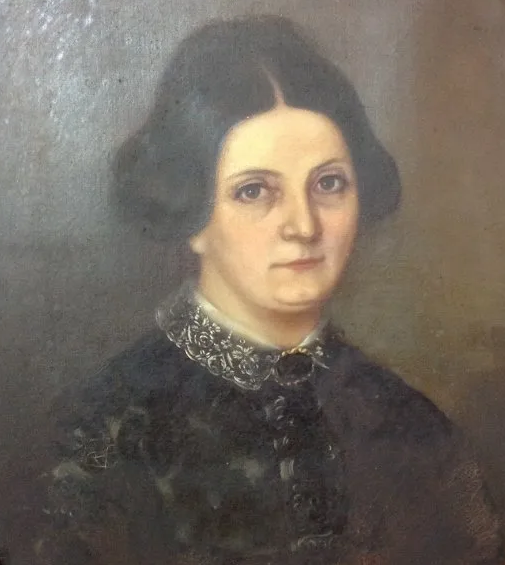
Elizabeth Patton Crockett grave marker in Acton Cemetery. David Crockett of Tennessee, Hero of The Alamo.
She arrived in North Central Texas early enough (1853) to be among the first of the white settlers, early enough to suffer all the hardships and grief that the frontier had to offer. Hood County was yet to be chartered; land surveyors were busily shuttling back and forth from Comanche and Kiowa country to Austin with maps and hopes of striking it rich with new land speculations. We do not know exactly how the widow Elizabeth and her group of west Tennessee farmers got to Texas. Probably they followed the same route that her dead husband David had followed 17 years earlier – down the Mississippi to the Arkansas river and somehow overland to St. Augustine or Nacodoches in east Texas then up the Trinity.
The Texas national government had awarded 640 acres of land to all men who had fought in the war for independence from Mexico, so David Crockett’s widow Elizabeth , her sons George and Robert, her daughter, Rebecca Halford and their respective families came to find and claim David’s grant. We know that the group had to spend nearly a year near Waxahachie before finding a land surveyor to take their claim and convert it to real land somehow. When this was finally done in Austin, they found that the 640 acres was shrunk to 320 – the cost of the survey. Since land was selling for a dollar or two per acre in the area, the survey cost was probably reasonable considering the dangers of Indian intervention. The grant they moved to was about 4 miles north of a growing trading post now called Acton, east of the Brazos river on Rucker’s creek. The land was more suited for rangeland than for cultivation; nevertheless Elizabeth set about making a new home.
Robert built a two-room log cabin for his mother and the family. Within two years, another cabin had been built for Elizabeth. She was then 65 years old and continued to do her share of the farm work
By the time the Civil War had begun, Robert and his wife Matilda Porter had nine children; some stayed in what is now Hood County, and some migrated north and south. One of Elizabeth’s grandchildren was killed during a robbery when he was returning from the War. Rebecca Halford, Elizabeth’s daughter was widowed in 1863. Another daughter, Matilda, stayed in Tennessee and never again saw her mother
By all accounts, Elizabeth was an intelligent lady who knew about business and farming matters. It was through her industry that her husband David was able to establish a mill and distillery in Tennessee. They were relatively prosperous until a flood destroyed the works. There are no known letters in Elizabeth’s artifacts, although it has been said that she could read and write well, unusual for a frontier woman of the times.
Elizabeth Crockett died after an early morning walk from her cabin, at age 72. She was buried in the Acton cemetery. Her remains and that of several family members are in what constitutes the Acton State Park and Monument, the smallest Park in Texas. Her statue above the grave shows her looking to the west, eyes shaded, waiting for her husband to come home from the War.
Compiled by Kenneth Hendricks, Hood County resident and great-great-grandson of David and Elizabeth Crockett.
Honoring a Widow of the Alamo — Elizabeth Crockett’s Land Legacy
In the nineteenth century, the government of Texas utilized its abundant land resources in numerous ways as forms of payment, reward, and acknowledgment. Elizabeth Crockett, the widow of the legendary Alamo defender David Crockett, was recognized by the Texas Legislature after her arrival in Texas along with her son, Robert P. Crockett. On February 2, 1856, the Legislature honored the sacrifice of her late husband and authorized “An Act donating to Mrs. Elizabeth Crockett one League of Land.”[1]
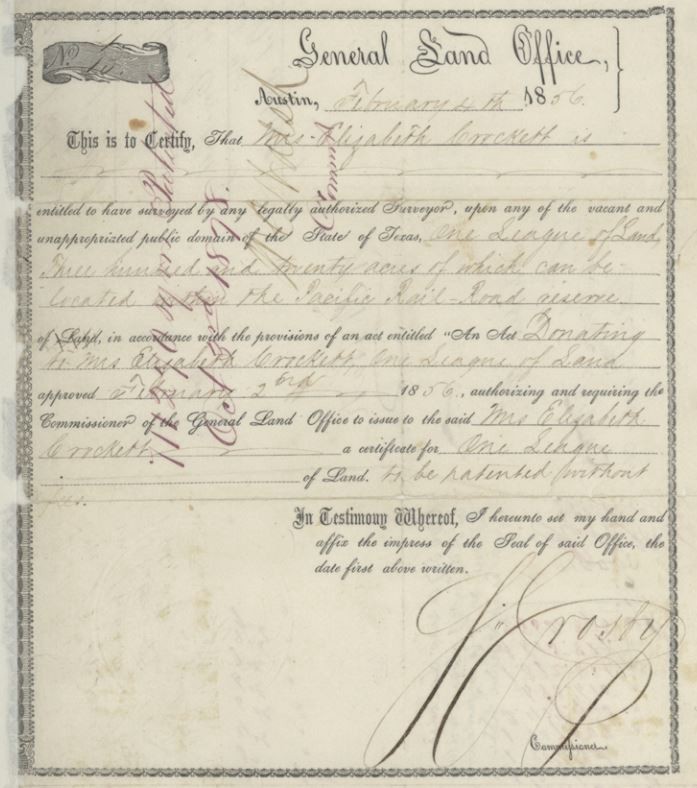
Born Elizabeth Patton in Swannanoa, NC on May 22, 1788, the future Mrs. Crockett was one of eight children. Her parents were considered well-off due to owning thousands of acres of farmland. She was described as “large, sensible, and practical” with a “good business mind and…regular habits.”[2] Elizabeth’s first marriage was to her cousin, James Patton. His death during the first year of the Creek War (1813–1814) left Elizabeth widowed with two children, living in rural Tennessee. Unfortunately for Elizabeth, she would lose another husband in battle several years later.
Elizabeth soon caught the eye of David Crockett, himself recently a widower with three children of his own. They quickly pursued a marriage agreement. Crockett reasoned that as he and Elizabeth “were in the same situation, it might be that we could do something for each other.”[3] He also reasoned that she was a “good industrious woman,” and her “snug little farm,” which Elizabeth herself owned, as well as her rumored personal savings of $800 would “better not only his present condition but also…bode well for his future prospects and those of his children.”[4] The two were married in the summer of 1815.
David and Elizabeth Crockett had three children together: Robert, Rebecca, and Matilda. Their marriage was strained, however. Hunting, exploring, and politics kept David away from home for long periods at a time, leaving Elizabeth to manage the combined eight children, the household, and the family’s business, which included a mill and distillery. Elizabeth’s strength and intelligence were known, and “she knew more about the operation of the mill and the family finances than [David],” and “always was grinding or lugging sacks of grain with ease” until the mill was destroyed by a flood in 1821.[5]
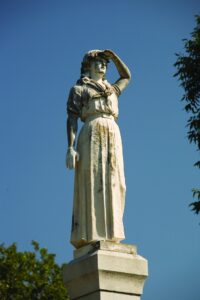
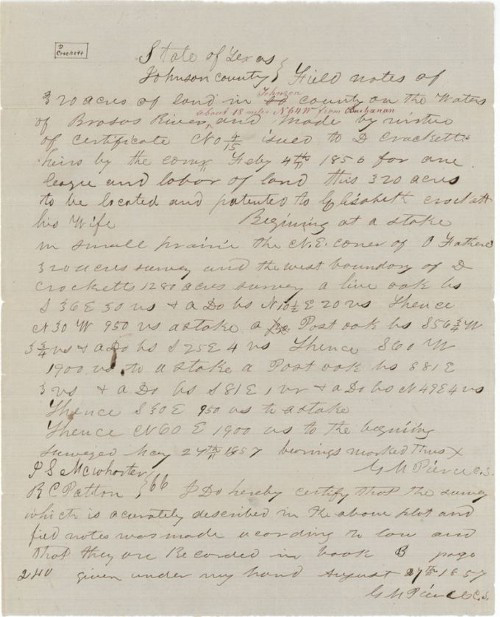
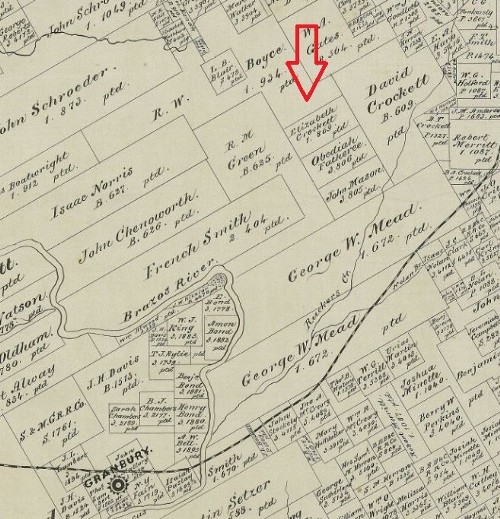
Over time, this had a damaging effect on the couple’s relationship. A religious woman, Elizabeth also disapproved of some of David’s habits and wanted him to be more involved in the church.[6] By 1832, Elizabeth had “endured enough of Crockett” and moved her family to live with her Patton relatives, leaving their relations “amicable but distant.”[7] Upon his arrival in Texas, Crockett was said to have remarked of Elizabeth and his children, “I have set them free — set them free. They must shift for themselves.”[8] Only a few months later, he was killed at the Alamo.
David’s son, Robert, quickly followed in his father’s footsteps to Texas with revenge on his mind.[9] He served for a year in the army of the Republic of Texas and claimed his father’s bounty certificate in April 1838 before returning to Tennessee, where Elizabeth still remained. The two returned to Texas in 1854 to settle permanently.[10]
It was upon this return that the Legislature honored Elizabeth with a donation of one league (4,428.4 acres) of land, waived her patenting fees, and allowed a special exception for Elizabeth to locate 320 acres of her land within the Pacific Railroad reserve, in which she was already living. She located the 320 acres in Hood County near present-day Granbury,[11] adjacent to David Crockett’s land that came from his military service bounty for having been “discharged from the Army by death,” at the Alamo. She sold the remaining acreage for $1,000.[12]
Elizabeth remained in Hood County until her death in 1860. It was reported that as a sign of mourning, she wore black every day from David Crockett’s death until her own, after which she was buried in the Acton Cemetery, still wearing her black dress, [13] approximately six miles from the land that was granted to her by Special Act of the Texas Legislature. In 1911, the Texas Legislature approved the creation of a monument to mark the gravesite. A 28-foot tall monument with a statue of Elizabeth Crockett on top, her hand shielding her eyes looking to the west awaiting her husband’s return, was installed in 1913. Now known as the Acton State Historic Site, Elizabeth’s grave was once the smallest state park in Texas (0.006 acres) before stewardship of the site was passed from the Texas Parks and Wildlife Department to the Texas Historical Commission.[14]
Reporting on her death, the Dallas Herald provided a fitting summary:
“It is a matter of just pride to every citizen of Texas that the widow of Davy Crockett found a home in her old age, and after her three score years and ten were fulfilled, a grave on the soil consecrated by his blood — the gift of the country of his adoption. The grave of his widow and the home of his children will make Johnson [now Hood] County a place of pilgrimage to many.”[15]
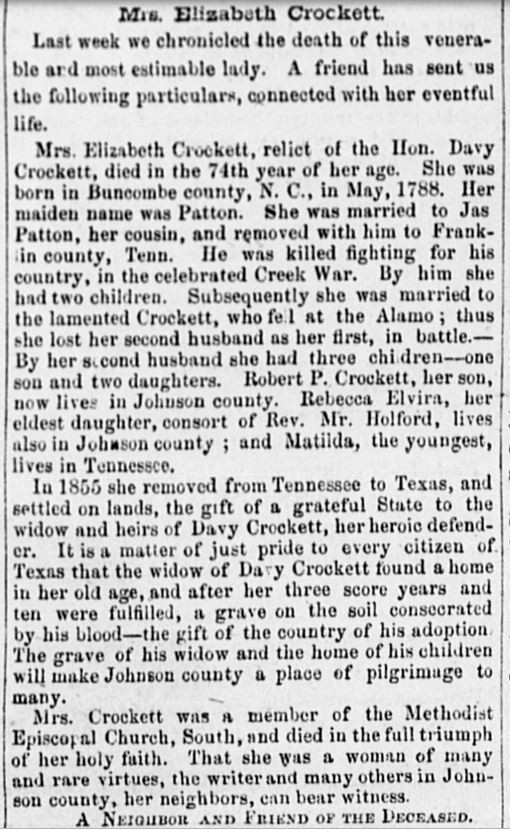
[left] Charles R. Pryor, Dallas Herald (Dallas, TX), Vol. 8, №35, Ed. 1, Wednesday, February 29, 1860, (texashistory.unt.edu/ark:/67531/metapth294113/m1/2/ accessed March 6, 2019), University of North Texas Libraries, The Portal to Texas History, texashistory.unt.edu.
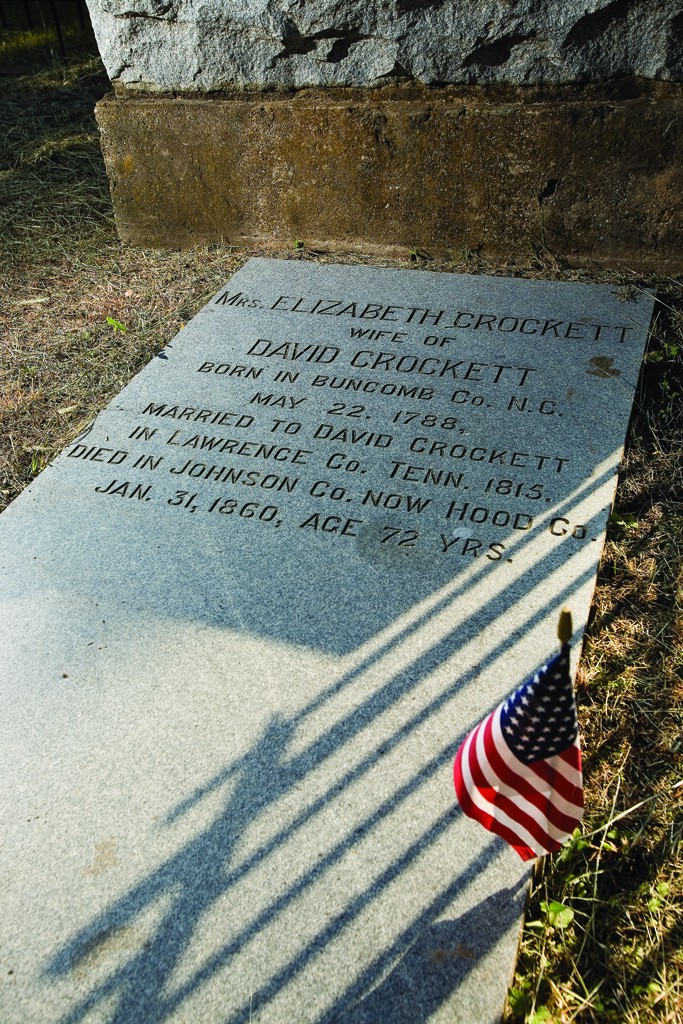
[right] Elizabeth Crockett’s headstone at the Acton State Historic Site. Image courtesy Texas Historical Commission.Elizabeth Crockett’s headstone at the Acton State Historic Site. Image courtesy Texas Historical Commission.
